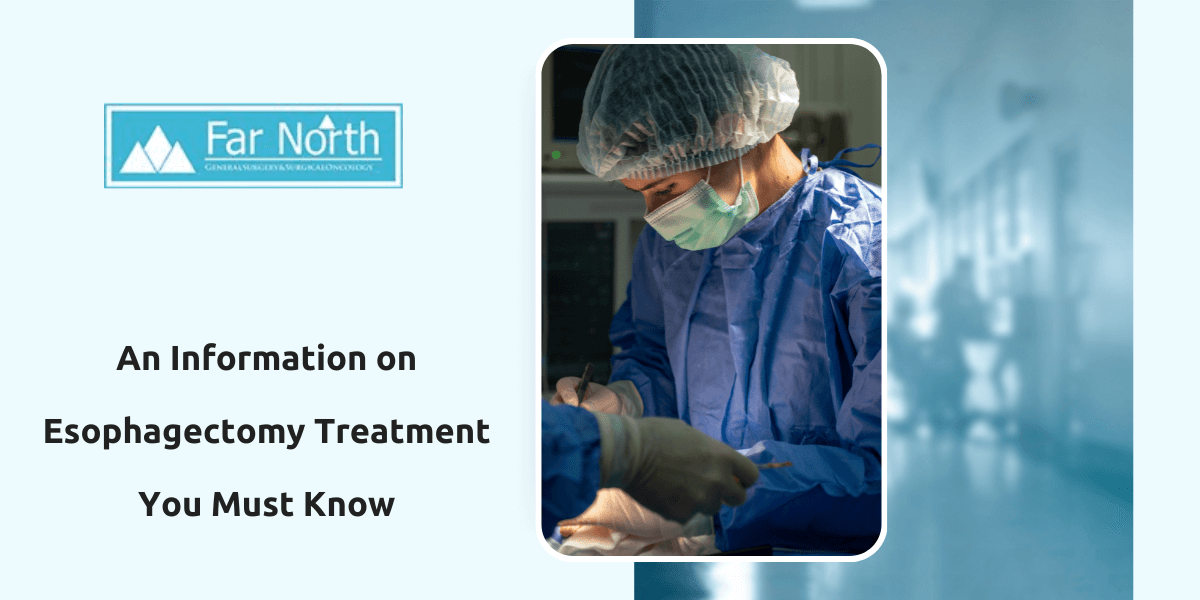


An esophagectomy is a major surgery that requires meticulous preparation to remove the esophagus (tube connecting mouth to stomach for food passage) or part of it. Esophagectomy needs thorough follow-up and care to ensure a successful outcome.
At Far North Surgery, our team of experienced surgeons is dedicated to providing you with the best care and treatment for esophagectomy. In this blog, we will provide you with all the information you need to know about an esophagectomy and the risks associated with it including aftercare.
An esophagectomy surgery carries a certain degree of risk. The most common risks include bleeding, infection, blood clots, and leakage from the esophagus. The risk of these complications varies depending on the type of surgery being performed and the patient’s overall health. A scientist mentioned that tobacco and alcohol are major risk factors for esophageal cancer.
In addition, some patients may react to anesthesia. It is essential to discuss all of these risks with your doctor before deciding to undergo an esophagectomy.
To reduce the risk of complications, it is important to follow your doctor’s instructions before and after the surgery. You should also get enough sleep and eat nutritious meals to ensure that your body is strong enough to handle the surgery. The American Cancer Society stated that treatment has improved and survival rates are getting better.
See Also: Minimally Invasive Surgery and Its Benefits: An Overview
There are two main types of esophagectomy:
An open esophagectomy is the most commonly performed and involves making an incision through the chest wall to access and remove the diseased esophagus. This procedure is usually done under general anesthesia and can take up to two hours to perform.
A minimally invasive esophagectomy is a more advanced technique that uses smaller incisions and specialized instruments to remove the diseased esophagus. This procedure is typically done under general anesthesia and can take up to four hours to complete.
Both types of esophagectomy are considered safe and effective treatments for esophagus cancer. However, your doctor may recommend one procedure over another, depending on your specific case.
Following your doctor’s instructions when it comes to recovery after an esophagectomy is essential. You should also be prepared for some pain and discomfort during this time. Your doctor may prescribe medication to help manage the pain, but it is important to follow the dosage instructions carefully.
It is also necessary to take it easy after the surgery. You should avoid strenuous activities such as lifting heavy objects or running for at least a few weeks or as directed by your doctor. You should also avoid smoking, drinking alcohol, and eating spicy or fried foods during your recovery.
Your doctor may also recommend attending physical therapy to help you regain strength and mobility after the surgery. They may also recommend that you attend counseling or support groups to help you cope with any emotional or psychological issues related to the surgery.
There are several options available when it comes to treating and diagnosing conditions related to the esophagus. Depending on your specific case, your doctor may recommend one or more of the following treatments:
An endoscopy is a procedure that involves inserting a thin, flexible tube with a camera at the end into the esophagus. This procedure is used to diagnose any abnormalities in the esophagus.
A biopsy is a procedure that involves taking a small tissue sample from the esophagus and examining it under a microscope. This is used to diagnose any cancerous cells or other abnormalities in the esophagus.
Surgery is a standard treatment for conditions related to the esophagus. This may include an esophagectomy, which involves removing part or all of the esophagus.
Radiation therapy is a type of treatment that involves using high-energy radiation to destroy cancerous cells in the body. This may be used to treat cancer of the esophagus.
Chemotherapy is a type of treatment that involves using drugs to kill cancer cells. This may be used to treat cancer of the esophagus.
See Also: Esophageal Surgery | Anchorage, Alaska
It is important to contact your doctor if you experience any of the following after your esophagectomy:
At Far North Surgery, our team of experienced surgeons is dedicated to providing you with the best care and treatment for esophagectomy. We are committed to providing an effective treatment plan tailored to your specific needs and goals.
Contact us today to schedule your consultation. Our team is here to answer any questions and provide you with the individualized care you need.